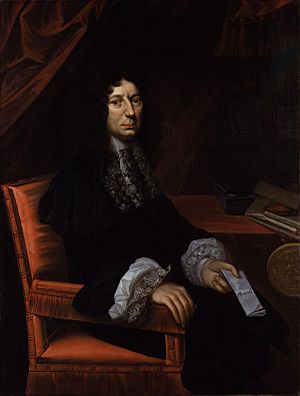Leoline Jenkins facts for kids
Sir Leoline Jenkins (born 1625, died 1685) was an important Welsh person. He was a smart academic, a skilled diplomat, and a fair judge. He also worked as a politician. Sir Leoline was known for being honest and fair in his work as a judge. He served as a top government official called the Secretary of State from 1680 to 1684.
Contents
Sir Leoline Jenkins' Early Life
Sir Leoline Jenkins was born in Llantrisant, a town in south Wales. His father, also named Leoline, was a small landowner. Sir Leoline spoke Welsh very well. He even liked to use Welsh proverbs, which sometimes confused people!
He went to school in the nearby town of Cowbridge. After that, he studied at Jesus College, Oxford, a famous university.
During the English Civil War
Sir Leoline Jenkins fought on the side of the King (the Royalists) during the English Civil War. When the King's side lost, he went back to Glamorgan in 1648. He stayed with a Welsh Royalist leader, Sir John Aubrey.
Jenkins started a small private school for Aubrey's son and other local boys. But in 1651, the Parliament closed his school. They thought it was training people who might go against the government. So, he moved to Oxford with some of his students. There, he started another school, sometimes called "the Little Welsh Hall."
However, in 1655, he had to leave England and go to Europe. When King Charles II of England returned to power, Jenkins was rewarded for his loyalty. He became a fellow at Jesus College. The next year, he became the Principal of the college.
Working for the King
As the Principal of Jesus College from 1661 to 1673, Sir Leoline Jenkins oversaw many building projects. This included the college library. These roles were given to him by King Charles II. They were a way to thank him for supporting the King during the Civil War.
A Fair Judge
Because he was good friends with Archbishop Sheldon, Sir Leoline also became a judge. He judged cases in different courts, including the Court of Admiralty. This court dealt with laws about the sea and ships.
People like Samuel Pepys, a famous diarist, praised Jenkins for being very good and honest as a judge. He helped create important laws for the English Admiralty Court.
Sir Leoline was also an expert in international law. This is about laws between different countries. In 1669, the Queen Mother, Henrietta Maria, died in France. Jenkins was sent to Paris to argue about her personal belongings. He successfully argued that English law should decide who got her property. This meant King Charles II received everything. The King was very pleased and made him a knight.
A Skilled Diplomat
In 1669, Sir Leoline was part of a group trying to unite England and Scotland. In the 1670s, he spent a lot of time in Europe. He worked on many important diplomatic missions.
He was England's main representative at the Congress of Nijmegen. This big meeting from 1676 to 1679 ended the Franco-Dutch War. For a while, he was the only English representative there. Some people said he felt a lot of pressure. The peace agreement wasn't exactly what England wanted. But this was more because other countries didn't like England interfering, not because Jenkins made mistakes.
Secretary of State
In 1680, Sir Leoline Jenkins became a member of the King's special advisory group, the Privy Council. During a time called the Exclusion Crisis, he strongly opposed a plan to stop the King's brother from becoming king. He was a strong leader for the government in Parliament.
He served as a Secretary of State from 1680 to 1684. This was a very important job in the government. He helped write important laws about property and inheritance. He was known for being hardworking and honest.
Some people thought he was a bit serious. But he could also be very strong when needed. Once, some other advisors questioned him about keeping foreign policy information secret. Jenkins firmly defended his actions. He said that Secretaries of State could only share information if the King specifically allowed it. He always followed this rule.
In 1684, his health was failing, so he retired. He died the next year. Sir Leoline never married.
He is seen as a very important person for Cowbridge Grammar School. He had attended the school himself. He left most of his money to Jesus College, Oxford, where he is buried in the chapel.
Helping Future Clergy
In his will, Sir Leoline Jenkins noticed that there weren't enough religious leaders (clergy) working for the King's navy or in the colonies. To help with this, he set up two special positions at Jesus College. These positions were for people who would serve as clergy in the navy or in the colonies. The last person to hold one of these positions was appointed in 1876.
Images for kids
 | Laphonza Butler |
 | Daisy Bates |
 | Elizabeth Piper Ensley |



